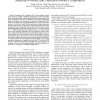476 search results - page 57 / 96 » Distributed Cooperation and Diversity for Hybrid Wireless Ne... |
COLCOM
2005
IEEE
14 years 1 months ago
2005
IEEE
When two sponsoring organizations, working towards separate goals, can employ wireless sensor networks for a finite period of time, it can be efficiency-enhancing for the sponso...
PARA
2004
Springer
14 years 1 months ago
2004
Springer
ct The Wireless World Research Forum (WWRF) has identified ambient-awareness and device diversity as two key properties of applications and services in future mobile systems [1]. ...
VTC
2010
IEEE
13 years 6 months ago
2010
IEEE
—Systematic Luby Transform (SLT) codes constitute rateless codes, which are capable of adaptively adjusting their code rate depending on the channel quality without explicit chan...
INFOCOM
2006
IEEE
14 years 1 months ago
2006
IEEE
— Although cooperation generally increases the amount of resources available to a community of nodes, thus improving individual and collective performance, it also allows for the...
GLOBECOM
2010
IEEE
13 years 5 months ago
2010
IEEE
Opportunistic routing is a well-known technique that exploits the broadcast nature of wireless transmissions and path diversity to form the route in an adaptive manner based on cur...

